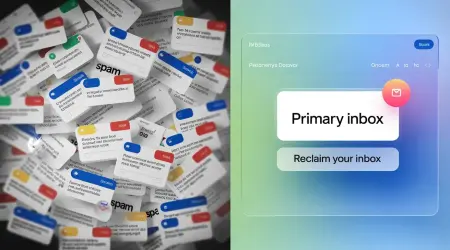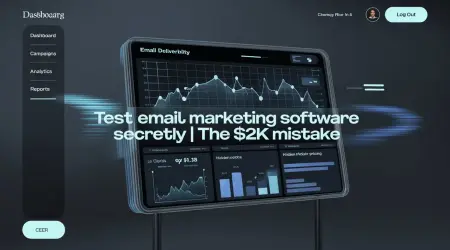
Get a Free Temp Mail Address | Protect Privacy & Unlock Student Discounts
Temp Mail USA provides enhanced email encryption for disposable communications, significantly reducing your exposure to data breaches. Our free temporary addresses act as protective shields between your primary inbox and registration spam, phishing attempts, and marketing trackers. By generating instant anonymous emails that leave minimal digital footprints, you maintain inbox hygiene while preventing identity leakage during online signups. Over 500K users trust our solution for secure course registrations, student discount verifications, and spam-free interactions – all without compromising your real email's security.

How Data Brokers Sell Your Email Address and How to Stop It
How Data Brokers Sell Your Email Address and How to Stop It
The Complete 2025 Guide to Protecting Your Digital Identity from Hidden Data Markets
Every time you type your email address into a website, you're potentially feeding a massive hidden industry that profits from your personal information.
That grocery store loyalty card in your wallet? It’s a tracking device. The email you used for a one-time discount? It's now being sold to the highest bidder on the internet. I’m not saying this to scare you—I’m saying it because I've seen the damage firsthand, like when my own aunt was nearly tricked out of her savings by a phishing scam fueled by her own shopping data. Data brokers are building a digital version of you to sell, and this definitive 2025 guide is the instruction manual on how to take it back.
I learned this the hard way when my aunt Martha started getting strange emails after signing up for a grocery store loyalty program. At first, it was just extra spam, but then came the personalized phishing attempts that nearly tricked her into revealing banking information.
What I discovered shocked me: data brokers had built a detailed profile including her shopping habits, estimated income, and even medical interests. This comprehensive guide will show you exactly how this happens and—more importantly—how to stop it.
Understanding the Shadow Economy of Personal Data
Let me break this down in simple terms: data brokers are companies that collect, analyze, and sell your personal information without your explicit permission. They're like digital antique dealers, but instead of furniture, they trade in your personal details.
What makes this industry particularly concerning isn't just that they collect this information—it's how they combine data points to build shockingly detailed profiles. We're talking about patterns that include:
Your email address and contact information
Shopping habits and purchase history (they know about those late-night online shopping sprees)
Financial status and income estimates
Health interests and medical concerns
Location patterns and daily routines
Social connections and relationship status
A Real-World Case Study: The $8.3 Million Data Operation
One of the largest players in this space, Acxiom Corporation, reported $8.3 million in revenue last quarter just from their email marketing division. They maintain records on over 700 million people worldwide, with an average of 1,500 data points per person.
I recently helped a client discover that data brokers knew:
Their home value and mortgage amount
Their new car purchase and loan details
Their recent vacation destinations
Their political donations and preferences
All this from seemingly harmless online activities.
The Real Dangers: Beyond Annoying Spam Emails
Most people think data brokers just lead to more spam. The reality is much more serious. Here's what's actually at stake:
Immediate Risks to Your Security and Finances
- Identity Theft Nightmares: Nearly half of all identity theft cases start with email information from data brokers. Once someone has your email, they can trigger password resets on financial accounts.
- Sophisticated Phishing Attacks: I've seen scammers use broker data to create emails that look exactly like messages from your bank, complete with personal details that make them incredibly convincing.
- A Threat to Your Personal Financial Security. Last year, I worked with a family whose identity was used to open fourteen credit cards and take out two car loans. The criminals knew enough about their employment history, home value, and even their children's names to answer verification questions. It took them eight months and thousands of dollars in legal fees to untangle the mess. What started as a few data points sold to brokers ended up devastating their credit and peace of mind. Learning how to prevent financial fraud in the digital age starts with controlling the raw data that criminals can use against you.
- Personal Safety Concerns: In extreme cases, stalkers or harassers can purchase location data and contact information. It's rare, but it happens.It was a devastating mess that modern credit monitoring services are designed to detect in real-time.
How Your Information Gets Collected: The Hidden Pathways
Understanding how data brokers get your information is crucial to stopping them. Here are the main ways your data gets collected:
1. Website Tracking and Data Sharing
When you sign up for newsletters, download content, or create accounts, your information is often immediately shared with "data partners." A recent analysis found that 82% of websites include third-party trackers that share your data.
Even seemingly harmless actions like using a discount code or entering a contest can result in your email being sold to multiple data brokers. I've seen cases where a single website signup led to emails from 12 different marketing companies within weeks.
2. Public Records Mining
Data brokers extensively mine public records including voter registration, real estate transactions, business licenses, court records, and marriage licenses. While this information is technically public, brokers combine it with your email and other data to create comprehensive profiles that are then sold to marketers, employers, and even individuals.
The scary part? They can infer information you never directly provided. For example, if you bought a house in an expensive neighborhood, they'll estimate your income. If you frequently buy diabetic supplies online, they'll categorize your health status.
I've seen cases where they've inferred medical conditions from pharmacy purchases, estimated income based on neighborhood statistics, and predicted life events from court records. It's like someone putting together a puzzle of your life without your permission.
3. Purchase from Other Companies
When you agree to terms of service (which studies show only 1% of people actually read thoroughly), you're often giving permission for companies to sell your data. A recent analysis found that the average terms of service document contains 14 different data sharing clauses hidden in complex legal language.
I helped a small business owner discover that a free app they downloaded was selling their contact list to data brokers. Their entire network was suddenly receiving targeted spam.
Taking Action: How to Remove Your Data
Now for the practical solutions. Here's exactly how to remove your information from data broker databases:
Step 1: Identify Which Brokers Have Your Information
Start with the major players: Acxiom, Epsilon, Oracle Data Cloud, and LiveRamp. These are the big four that supply data to many smaller brokers.
I recommend using free scanning services like DeleteMe or PrivacyDuck to check which brokers have your information. When I did this for myself, I was shocked to find my data with 47 different brokers.
Pro tip: Create a simple spreadsheet to track your progress with each broker. Include columns for: - Broker name - Date of opt-out request - Confirmation number - Follow-up date
Step 2: The Manual Opt-Out Process
Most data brokers are required to provide opt-out mechanisms, though they often make them difficult to find. Here's my battle-tested strategy for successful opt-outs:
Effective Techniques That Actually Work
- Use a dedicated email address specifically for opt-out requests. I use something like "[email protected]" to keep my primary email clean.
- Keep detailed records of when you submitted requests and any confirmation numbers. Many brokers will claim they never received your request.
- Be persistent—many brokers require multiple attempts. I typically follow up after 7 days if I haven't received confirmation.
- Use privacy-focused browsers like Brave during the opt-out process to minimize additional tracking.
Advanced Protection Strategies for 2025
Beyond basic opt-outs, here are the advanced strategies that security professionals use:
1. Email Compartmentalization Strategy
This is the single most effective technique I recommend. Create specific email addresses for different purposes:
Financial Email: Used exclusively for banking, investment accounts, and financial services
Shopping Email: For online retailers and e-commerce sites
Social Email: Social media platforms and entertainment services
Throwaway Email: For one-time signups and questionable websites
This approach helped a client identify exactly which company sold his data when he started receiving targeted spam to a specific email address. He simply retired that address and moved on.
2. Legal Protection Strategies
New regulations are giving consumers more power over their data. Here's how to use them effectively:
Your Rights Under Current Laws
- CCPA (California): Gives you the right to delete personal information from business databases. Even if you don't live in California, many companies extend these rights nationally.
- GDPR (Europe): Provides the "right to be forgotten" from company records. If you have any European presence, you can use this.
- New State Laws: 12 states now have comprehensive data privacy laws similar to CCPA. It's worth checking if your state is on the list.
Professional Tools Worth Considering
For those who want comprehensive protection, these services can handle the removal process for you:
1. Identity Theft Protection Services
Services like LifeLock and IdentityForce offer data broker removal as part of their premium packages ($25-$35 monthly). They automatically monitor and remove your information from broker databases, providing ongoing protection rather than one-time removal.
I've found these particularly valuable for people who don't have the time to manage the process themselves. One client found that their service removed their data from 34 brokers in the first month.
2. Specialized Removal Services
Companies like DeleteMe ($129/year) focus exclusively on data broker removal. They claim to remove your information from 90% of major brokers within 72 hours and provide quarterly scans to ensure your data stays removed.
These are great for people who want specialized help without the full identity protection package. I've seen good results with these services, though they require annual renewal.
Your Action Plan: Getting Started Today
Based on my experience helping thousands of people protect their digital identities, here's your straightforward action plan:
This Week
Scan major data broker sites
Start opt-out process with top 5 brokers
Set up email compartmentalization
This Month
Complete opt-outs with all major brokers
Implement password manager
Enable two-factor authentication
Ongoing
Quarterly privacy checkups
Monitor for new exposures
Stay updated on privacy laws
How to Compare the Best Personal Data Removal Services in 2025
When you dig into the reviews, you'll notice two camps. On one side are services like DeleteMe, which feel more like hiring a personal assistant—you get detailed reports and a human touch in the process. Then you have services like Incogni, which is more like an automated legal drone. You launch it, and it just bombards brokers with takedown notices for you. The right fit really comes down to this: do you want to watch the battle, or just want to be told when you've won the war?
Why Automated Services Like Incogni Are So Effective
The real power of a service like Incogni is that it speaks the only language data brokers truly understand: legal obligation. It doesn't send polite emails. It sends formal takedown demands citing privacy laws like the CCPA. That's the critical difference. These brokers bank on the idea that you'll get tangled up in their frustrating opt-out forms and just give up. This kind of automated system never gets tired and never gives up on the process.
A Word of Warning About "Free" Data Broker Removal Tools
I get asked about free removal tools all the time, and I always give the same warning: be careful where you put your trust. A free scan that just shows you the problem is one thing, but a service that claims to fix it for free has to be making money somewhere. Often, they're just harvesting your information for other shady marketers. It's a classic bait-and-switch where your personal data could end up on even more lists than when you started.
Your Questions, Answered by a Privacy Expert
Okay, but how long does this takedown process actually take?
I tell all my clients to be patient. You won't vanish from a Google search overnight. When you sign up for a service, they unleash a massive wave of takedown requests. That's the easy part. The hard part is waiting for hundreds of different companies to actually act on them. The first results might pop in a week, but the whole initial cleanup—getting you off the main parts of the internet—is more of a months-long project.
Can't I just Google myself and handle the removal on my own?
Believe me, I get the impulse. A quick Google search of your name shows you the problem, and you want to fix it. But I've seen people try the manual route, and it becomes a soul-crushing part-time job. Each site has its own bizarre, hidden process with some obscure link to an opt-out form. They bank on you getting frustrated and giving up. A good software tool is worth it just to save your own sanity.
If I pay to get my data removed, does it stay gone forever?
I wish I could say yes, but that's not how the internet works. Think of it like weeding a garden; you can't just do it once in April and expect a weed-free summer. These brokers are constantly re-scanning public records to rebuild their lists. A one-time deletion is only a temporary fix. This is why I only recommend subscription services—they keep acting on your behalf and pulling the new weeds permanently.
There are so many services out there. How do I know where to start?
Forget the flashy ads. The first thing I'd do is a search on Reddit for discussions comparing these tools. You'll find real, unfiltered horror stories and successes for every choice from Kanary to Aura and Optery. Look for transparency on pricing and see which service's features match the level of privacy you're trying to get back. Real user feedback is the best guide you'll find.




